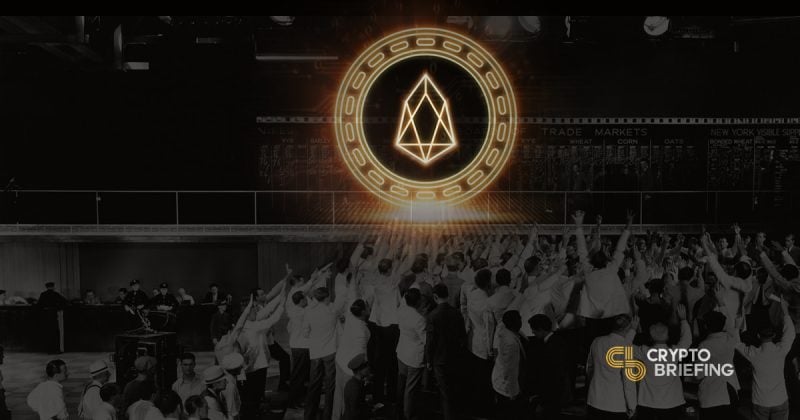
EOS Block Producer Traded RAM To $600K Profit – And Did Nothing Wrong
Rather than creating new dApps and extending the network, some EOS Block Producers are speculating on network resources instead.
Your town just decided to introduce fiber-optic Internet access. After deliberations and town halls, and careful planning by engineers, the community agrees to buy miles of cable for installation.
Then, just as the Mayor is about to sign the contract, members of the town council and chamber of commerce buy up every inch of fiber – and sell it back to the public at a massive premium.
That’s the situation facing EOS, a decentralized community whose governance is somewhere between the Philadelphia Convention and a free-market Lord of the Flies. Rather than focusing on creating new dApps and extending the network, some developers have found a more profitable business model: trading network resources.
A speculative market has emerged for RAM, the gold of the EOS economy. RAM is vital to the creation and growth of distributed applications. But unlike a token, there’s no secondary trading–RAM is bought and sold from the network, via an algorithm that mimics market pricing.
Because it is a scarce resource, RAM prices have skyrocketed in the past week, reaching a peak of 900 EOS per megabyte. Dan Larimer (CTO of EOS) has proposed revising the algorithm for pricing; until then, an EOS Rich List, collected from data visible on the EOS blockchain, shows that users are hoarding hundreds of megabytes of RAM.
That bubble may be hampering the growth of EOS. For one thing, simply opening a new account requires a fee of 4kb–which, at peak prices, cost around $30.

Ram for Sale
Some developers have made significant profits from selling their RAM. Everipedia, which seeks to establish a blockchain-based, for-profit alternative to Wikipedia, began buying RAM in June to airdrop its EveripediaIQ token. But as prices rose, they decided to sell instead.
Everipedia, along with its partners Ikigai Asset Management and Dollar Vigilante, constitute LibertyBlock, one of EOS’ top Block Producers.
“I bought 500MB of RAM on behalf of Everipedia,” says Kedar Iyer, Everipedia’s Director of Software. “At some point we made a decision that the RAM market was overpriced and we would be better off buying back in later and at that point we sold.”
“We thought it might go up 50% or so max and wanted to buy while it was still cheap [around 20 EOS/MB], ” Mr. Iyer said over Telegram.”But by 700 we all decided it was getting to be a joke and sold what we had left.”
An EOSFlare account indentified by Mr. Iyer as his personal account shows that, after spending 10,000 EOS on buying the 500MB of RAM, the proceeds from selling it back exceeded 81,000 EOS – Everipedia made approximately $600,000 this way.
Sam Kazemian, CEO of Everipedia, defended the trades, while concurrently agreeing that the RAM market had gotten out of hand. “We strongly support increasing the RAM limit,” he said over Telegram. “As developers, it is important that it’s used for real purposes as well as market speculation. Markets bring allocative efficiency, but too much without genuine consumer/developer use and it is detrimental to growth.”
Timothy Lewis is Founder of Ikigai Asset Management, one of Everipedia’s LibertyBlock partners. When asked if RAM speculation bothered him, he replied that “If they are doing it non-BP account than no. If they are doing it with the direct BP rewards, yes.” There is no suggestion that Everipedia was using BP rewards in its trades.
Block Producers Face Conflicting Interests
Another Block Producer, EOS Nation, was also recently found to have traded RAM at a hefty profit. Although EOS Nation has attempted to disperse its profits in a community fund, the trades resulted in some strong criticism from the community.
On the EOS chain, Block Producers function in a role analogous to miners and legislators, and they also put resources like servers and RAM into the system. With only 21 spots available, elections are highly competitive, and many producers make detailed plans for community engagement and transparency.
Some Block Producers have explicitly distanced themselves from the RAM market. “We believe that the resources available on the EOS platform are meant to be used for their utility, not their ability to generate gains,” said EOS New York, another leading Block Producer, in a transparency statement.
“No Fiduciary Duty…”
Neither EOS Nation or Everipedia stands accused of doing anything wrong. They didn’t break any laws, or rules – at most, they may have breached an unspoken expectation that resources are for network development.
Even then, in a response to Crypto Briefing, Dan Larimer was clear that there was “No fiduciary duty in [the] constitution” compelling Block Producers to act within any specific guidelines regarding the trading of RAM.
And, in a network where the ideals are explicitly modeled on free trade and laissez-faire principles, it’s hard to complain if they take profits where they can.
But it does raise questions about the relationship between public resources and private markets, especially if the builders of EOS are currently finding it more profitable to sell bricks than to lay foundations.
Andrew MacDonald contributed to this article.
Neither author is currently invested in EOS, but they own other cryptocurrencies.
